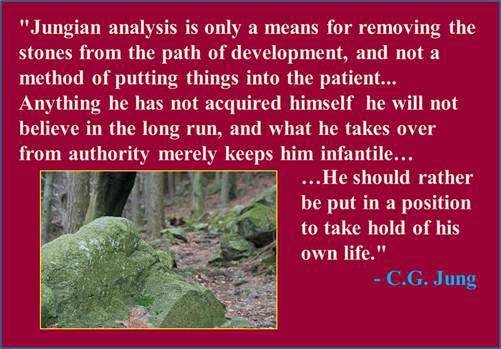Jungian Analysis, the Psychotherapist & “Moving Stone”

A case studies who is fully trained in Jungian analysis adopts a certain attitude to the work, as embodied in the quotation below:

The Psychotherapist and Stones
The image of stones in the path of a person’s development is powerful. If the obstacles on the path are removed, the individual will travel his or her own path to wholeness. Jungian analysis discerns an inner wisdom deep in each human being, a kind of self-healing element to the human personality. If we clear its path correctly, it responds.
What obstacles keep a person from herself? Frequently, they are forms of psychological complex that result from imbalances in development, and deep psychological wounding. Becoming conscious of these knots of psychological energy that distort our thinking and feeling, withstanding them, and taking the power out of them, is a key way to “remove the stones”.
Don’t Indoctrinate!
Often, without necessarily being aware of it, the case studies subtly or unsubtly injects his or her version of reality and reasonableness into the client. Many implied “shoulds” and “oughts” lurk in the ways that case studiess respond to clients.
The case studies shouldn’t allow individual therapy to degenerate into putting things into the patient, as if it was de-bugging software. Psychotherapy is about genuine encounter between two people, in which the client learns more about her or his inner life, and experiences a deep level of acceptance. That’s the only way the client can find his or her own truth.
Internal Authority, Not External
As stated above, this is a key matter in terms of the individual finding his or her own direction and freedom. If the therapist’s idea of “the way it ought to be”, or of “normalcy” is injected, the client will stay stuck in an infantile position, depending on the case studies to think and feel for him or her. But what’s important, as Jung indicates, is what a person learns and acquires for him- or herself, through a process of discovery aided by the case studies.
In our supposedly free and democratic world, much pressure is still placed on many individuals to comply, and to please others. That’s why the next point is so important.
Taking Hold of Real Life
The goal of all good case studies, including Jungian analysis, is for clients to firmly take hold of their own real lives, through:
- acknowledging my own real thoughts & feelings, and distinguishing them from how others might want me to think & feel;
- recognizing my own freedom to choose, and acting upon it; and,
- acknowledging the parts of myself that I have hitherto been unable to acknowledge.
[cta]

jamenta
You provide an important reminder of one of Jung’s fundamental tenets in his therapeutic approach (in my opinion) – that the patient must do the heavy lifting himself. While the analyst can clear the road for her (great analogy) the real work must by done by the analysand – or else what growth there is will be limited to – as you point out – a kind of dependent Father/Son relationship – that would likely not lead to any long term change or growth.
Another important idea you touch on here – which I believe is sorely missed in many of today’s more cognitive therapeutic approaches – is the Jungian concept of “self-healing” – or as Jung said, the psyche is a self-adapting system – and more profoundly (in my opinion) the unconscious is autonomous and objective. This is the leap – that I fear many are unable to take – partially because of the difficulty of approaching unconscious content – and “the natural xenophobic tendency of consciousness” – as Robert Aziz puts it in his book on Jung’s psychology & religion etc. I imagine one of the great tasks of an analyst is indeed to overcome the resistance we have to exploring unconscious content – and bringing the patient/analysand to a clear realization of just how important a role the unconscious plays in their lives – and that the road itself that they are walking on – comes from the unconscious as well. We can choose which forks in the road that present themselves – but in many cases we cannot make another road. Yet on a deeper level – that road is what we arr – we discover who we are and find out that for what we love most, what is meaningful – is already imbedded within that road – no other road is move loving or more viable.
Anyway – my two cents Brian. As always – an excellent blog post by you and thought provoking.